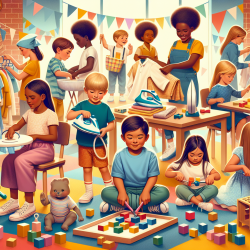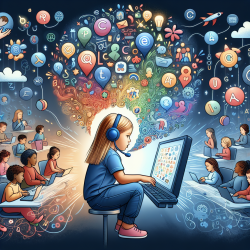Introduction
As practitioners in the field of speech-language pathology, we are uniquely positioned to influence the developmental trajectories of young children. A recent study titled "US and Chinese Preschoolers Normalize Household Labor Inequality" offers insights that can enhance our practice by addressing how children perceive and internalize household labor divisions. This blog explores the study's findings and suggests ways practitioners can use this knowledge to foster fairness and equality in young minds.
Understanding the Research
The study conducted by Midgette, Ma, Stowe, and Chernyak (2023) investigates how children as young as preschool age perceive household labor distribution. The research involved interviewing children aged 3 to 10 from the United States and China, alongside their caregivers, to understand their views on who does more household work. The findings revealed that even at a young age, children recognize that mothers typically perform more household labor, and surprisingly, they often view this as fair.
Key Findings
- Children from both cultural contexts observed that mothers do the majority of household labor.
- Despite recognizing this inequality, children generally judged it as fair, indicating a normalization of inequality.
- The study highlights preschool age as a critical period for discussions about gender norms and labor distribution.
Implications for Practitioners
As practitioners, understanding these findings can guide us in fostering environments where children learn about equality and fairness. Here are some strategies to implement:
- Encourage Discussions: Initiate conversations with children about household roles and responsibilities. Use storybooks and role-playing activities to illustrate diverse family dynamics and equitable labor distribution.
- Model Fairness: Demonstrate equitable practices in your interactions with children. Show them that fairness means sharing responsibilities, regardless of gender.
- Involve Families: Work with families to raise awareness about the impact of gendered labor divisions. Encourage parents to discuss and model equitable labor practices at home.
- Promote Critical Thinking: Use open-ended questions to encourage children to think critically about fairness and equality. Ask them how they would feel if roles were reversed or shared equally.
Encouraging Further Research
While this study provides valuable insights, it also opens avenues for further research. Practitioners can contribute to this field by exploring how interventions at the preschool level can alter perceptions of fairness and equality. Collaborating with researchers to conduct longitudinal studies can help track the long-term impact of early interventions on children's views about gender roles and labor distribution.
Conclusion
By integrating the findings from this study into our practice, we can play a pivotal role in shaping a generation that values fairness and equality. As we engage with young children and their families, let's strive to create environments that challenge traditional norms and promote gender balance. For those interested in delving deeper into the original research, please follow this link: US and Chinese preschoolers normalize household labor inequality.










